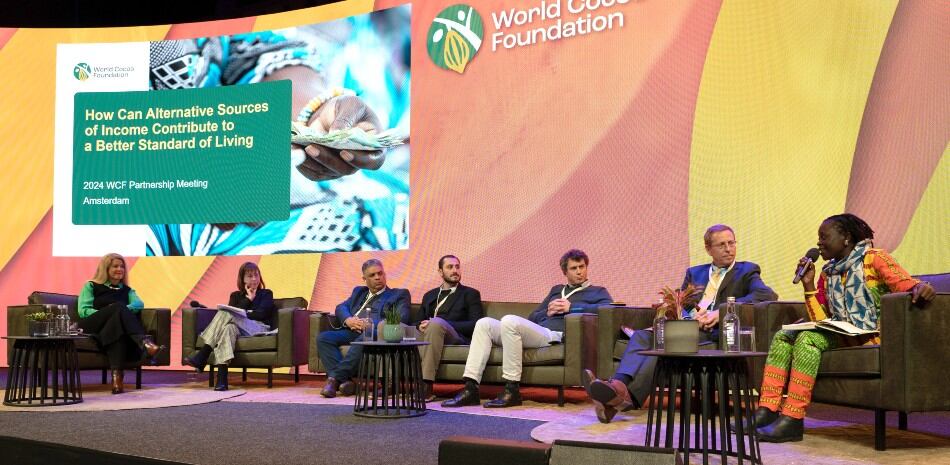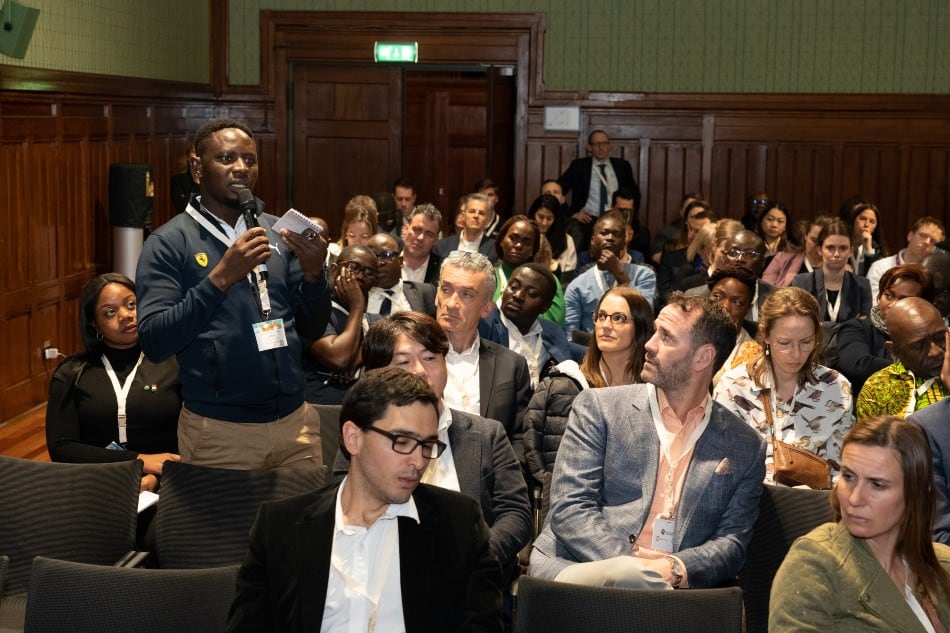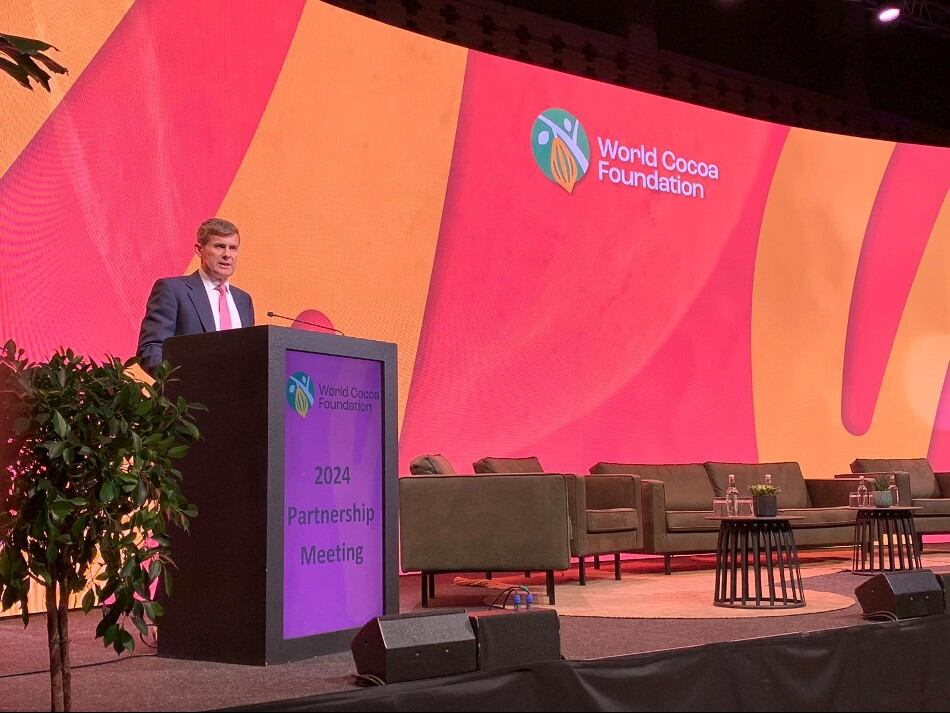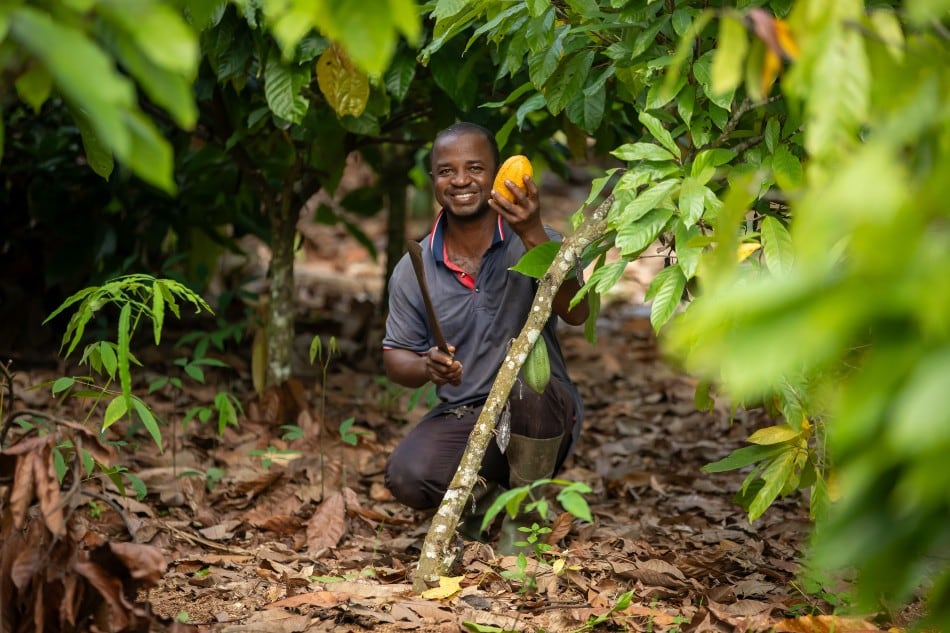During the past two days in Amsterdam, Vincent said the passionate debates had remotivated the WCF. “The one thought that drives us all now at the WCF is on alignment, convening, collaboration, and partnership.
“They're all critically important and have been mentioned frequently these last few days. And aligning for global action has been the theme of the conference. But in the language of our new strategy, we constantly remind ourselves that these are building blocks. They are important. But what is important and matters is that they deliver change and results - and the ultimate result is a thriving and equitable cocoa sector.”
Day two of the meeting began with a speech from Christine McGrath, SVP and chief sustainability and impact officer at Mondelez International. McGrath is also the WCF Chair and part of the new strategy team. She urged members to “push the conversation and challenge the status quo.”
She said the world is changing rapidly and demanding that we [the cocoa industry] change with it. “There was a lot of talk on day one about preparing for the upcoming [EUDR) regulations, which is understandable. This is an important topic but a relatively short-term one at WCF. We've been working on interrelated systemic issues like deforestation, farmer poverty, and child labour. And we must continue to keep this focus.”
The challenges we face are pre-competitive … we can successfully address them if we find win-win solutions to drive real change -- Christine McGrath, chair, WCF
McGrath said the WCF’s refreshed vision is to catalyze a thriving and equitable cocoa sector, collaborating to improve farmer income, reverse deforestation, and help combat child labour.
“The challenges we face are pre-competitive … we can successfully address them if we find win-win solutions to drive real change. The World Cocoa Foundation is committed to bringing together diverse organisations,” many of which, she said, are represented at the Partnership Meeting.
She praised the Cocoa & Forests Initiative and the excellent progress made on traceability and agroforestry. “Now we are seeking to achieve an even greater impact, conserving forests and restoring degraded lands through collaborative investment by cocoa and chocolate companies outside their supply chains and alongside government partners.”
She said Mondelez has been an active industry member of the landscapes issue initiative and is collaborating to implement climate-smart cocoa production practices and agroforestry models.
Kojo Amoo-Gottfried, managing director of cocoa and chocolate indulgence at Cargill, reminded delegates that although cocoa prices may rise on the markets, the farming community is feeling the squeeze on incomes most, and they need more access to cash.
Wake up and smell the chocolate
If WCF members needed reminding why they were in Amsterdam, Judith Sargentinini, independent chair of the Dutch Initiative on Sustainable Cocoa (DISCO), said 25% of the world’s cocoa is traded through the city’s port and is part of the fabric of the city because at certain times you can almost taste the cocoa in the air as the aroma from the beans drifts over the buildings from the port.
Wake up and smell the chocolate, she urged, and create a living income for all cocoa families.
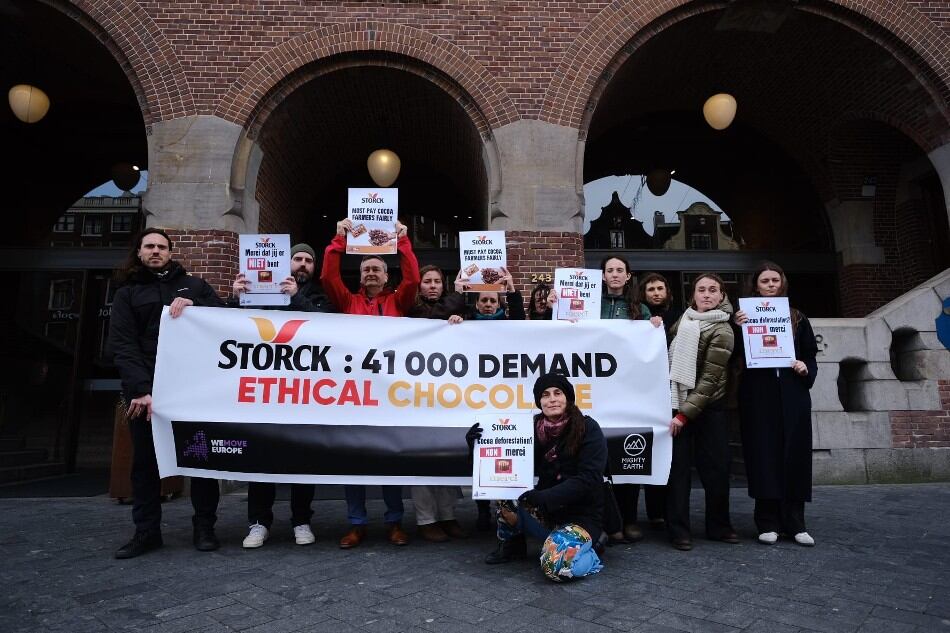
The WCF Partnership Meeting is part of Amsterdam Cocoa Week, which Mighty Earth targeted with a protest outside the venue, the Beurs van Berlage, on the opening day, targeting the German company Storck for its alleged lack of transparency in its supply chain and not paying farmers a decent living income.
Storck is not a WCF member, but still, it was another wake-up call for the chocolate industry in general on the challenges it faces in tackling farmer poverty, which everyone agrees is the root cause of sustainability issues such as child labour and deforestation in the cocoa chain.
A panel on a holistic approach to child labour reported that although policies, regulations, and various programmes have been implemented and communicated, they still have not had the desired impact at scale.
Cocoa farmer income
In the first of a trilogy of discussions on farmer income (the second will be at Chocoa later this week, followed by the third at the World Cocoa Conference in Belgium in April), the meeting heard there is plenty of support for the guiding principle of a living income for cocoa farming families. The first session concentrated on how the development and implementation of market-based policies can make a difference, especially with cocoa prices hitting another all-time high this week.
Michel Arrion, executive director of the ICCO and panel moderator, said it was a good thing that farmer income is now recognized as a crucial element in any debate around sustainability, but he asked if high prices alone solve the problem.
Alex Assanovo, executive secretary of initiative, Cacao Cote d’Ivoire-Ghana, said, “Price alone will not solve this problem. That's very clear.” The two countries he represents are the largest cocoa-growing countries in the world, and both boycotted the last WCF meeting in 2022 because of a lack of progress on farmer income from the industry.
“The past 10 years, farmer prices have been up and down. So, how can we have a long-term outlook? The Living Income Differential (LID) has been a stepping stone to what he described as the conflict between the ancient world, with its supply and demand that goes up and down and fluctuating prices. The LID is supposed to help farmers in Ghana and Cote d’Ivoire at least receive a regular amount of money, but whether that is even enough to live on has been a topic for debate since the LID was introduced in 2020-21.
Commitment on farmgate price
He said the industry can absorb high prices and that collectively, it should be able to work out a solution that rewards and benefits producers and protects their business, the people, and the planet. He called for a proper commitment on the level of farmgate price that will help sustain the sector, “otherwise, I can guarantee that anyone that's going to claim a sustainability programme without being able to demonstrate that farmer income is being featured into the programme will see the consequences.”
Cocoa has created a lot of prosperity for some over the decades – but also a lot of poverty -- Stephanie Daniels, Sr programme director, agriculture & development sustainability at Food Lab
Stephanie Daniels, Sr programme director, agriculture & development sustainability at Food Lab, said: “So I think what we're really talking about here is how … have the costs, social and environmental costs, been externalised over many decades to create a system that is very effective to serve the efficiency of moving goods around the globe in the market, and that has a value – but there's risk mitigation built into it. There are certain reasons that it exists as it is, but it isn't serving many of the goals we share, whether preserving forests, protecting children, or ensuring that rural families thrive. We shouldn't underestimate this challenge … certainly, price is part of the picture, but we must consider all the levers and drivers of the rural families' income.”
She said that cocoa has created a lot of prosperity for some over the decades – but also a lot of poverty. “Where can we leverage the power of trade to make more impact, particularly for the more vulnerable in the chain?” she asked.
Solomon Boateng is the executive secretary of Kuapa Kokoo Cooperative Farmer’s Union, which has 100,00 members, and he confirmed that the high prices of cocoa on the market have not as yet reflected on the farmgate price. He said, “As a cooperative, we know that specific initiatives can be implemented, so if the price improves, we will adapt.
“With the support of some key partners like Fairtrade we have implemented programmes in the past four or five years to diversify farming practices, whereby we have introduced the farmers into agroforestry and food agroforestry. We have to build resilience. But if the traders and buyers compete to buy at a higher price, the farmer can only benefit if you encourage them to produce more, and production will be sustainable at a higher price.”
Angela Chavez, head of sustainability at Hershey, said that chocolate is a value-orientated product, but 40% of production costs for cocoa is spent on labour. To help with farmer income in its direct supply chain, Hershey introduced an Income Accelerator Programme in 2023 that provides an extra $500 to families for implementing sustainable practices on their farms.

Back in the boardroom, Barry Parkin, Mars's chief procurement and sustainability officer, said that sustainability is now part of the company's overall business plan. There are returns and financial rewards for measures introduced, the same as a profit share, and there is a shift towards a ‘decommodification’ of raw materials. Roel Van Poppel, chief sustainability officer at ofi, noted that research shows that 75% of consumers are willing to pay a higher price for a sustainable product, which companies should note.
Deforestation and the EU
In a closing panel, Brian Mckeon, the USA’s National Confectioners Association SVP of public policy, said he had followed the debates closely. While a strong consumer trend existed for more sustainable chocolate, American consumers are primarily driven by cost. He stated that there would be no forthcoming legislation like the EUDR in an election year. Still, the Biden administration had been researching areas and topics surrounding sustainability.
It was left to Paul Davis, president of the European Cocoa Association, to finish on the topic that has dominated this year’s Partnership Meeting – the EUDR, or European Union Deforestation Regulation. The ECA has been a leading partner collaborating with the WCF on the legislation, and Davis has personally been involved in discussions in Brussels at the executive level.
“It’s not being simple, and there is still a long way to go,” he said. But suppose the WCF members take away one point from the year’s meeting. In that case, from the EU’s perspective, no European citizen should be complicit in any deforestation when buying goods that have been imported or produced in the EU market.
Before he closed the Meeting, Chris Vincent also announced that the next WCF Partnership Meeting would take place in a producing country and that Sao Paulo in Brazil had been chosen as the host.

